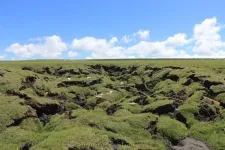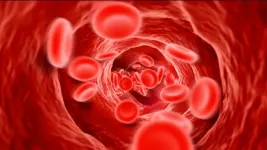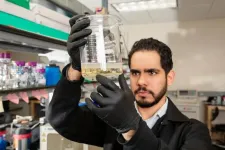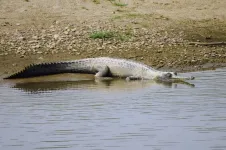Abrupt permafrost thaw intensifies warming effects on soil CO2 emission
2024-04-30
(Press-News.org)
According to a recent study published in Nature Geoscience, scientists have found that soil carbon dioxide (CO2) emissions are more sensitive to climate warming in permafrost-collapsed areas than in non-collapsed areas.
This study, based on field warming experiments combined with laboratory incubation of soils from a large-scale sampling, provides new insights about permafrost carbon–climate feedback in the context of future climate warming.
Warmer temperatures have led to rapid permafrost thawing in high-latitude and -altitude permafrost regions. Abrupt permafrost thaw, known as thermokarst, occurs in ~20% of the northern permafrost region, but this region stores about half of all below-ground organic carbon. This type of thawing can restructure land surface morphology, causing abrupt changes to the soil biotic and abiotic properties, which may significantly alter ecosystem carbon cycling.
Since both thermokarst and non-thermokarst areas are simultaneously experiencing ongoing warming, an important but so far overlooked consideration is whether the warming effects on soil CO2 flux might differ between these two distinct landforms.
To fill this knowledge gap, a collaborative research group led by Prof. YANG Yuanhe from the Institute of Botany of the Chinese Academy of Sciences has investigated how thermokarst formation influences the responses of soil CO2 fluxes to climate warming, using multiple approaches.
In a well-replicated warming experiment conducted simultaneously in thermokarst and non-thermokarst areas, the researchers found that the warming-induced increase in soil CO2 release was about 5.5 times higher in thermokarst features than in adjacent non-thermokarst landforms.
They then analyzed over 30 potential drivers of the warming effects on CO2 release using soil physicochemical analyses, solid-state 13C nuclear magnetic resonance, and metagenomic sequencing. They found that the greater warming response was mainly due to the lower soil substrate quality and higher abundance of microbial functional genes related to organic carbon decomposition in thermokarst-affected soils.
Furthermore, by incubating soils from six additional thermokarst-affected sites along a 550-km permafrost transect, they found that thermokarst formation significantly increased the temperature sensitivity of CO2 release, providing additional evidence for the stronger soil CO2 response to warming in thermokarst landscapes.
"As a preliminary exploration of its global importance, extrapolating the warming response of soil CO2 flux to all upland thermokarst regions in the Northern Hemisphere, there could be an additional 0.4 Pg C year-1 of soil carbon release, which is about a quarter of the projected permafrost soil carbon losses by the end of the 21st century," said Prof. YANG, corresponding author of the study.
This study provides multiple lines of evidence that warming-induced soil CO2 loss is stronger under thermokarst formation. These findings may help to more accurately project the future trajectory of permafrost carbon–climate feedback.
END
[Attachments] See images for this press release:

ELSE PRESS RELEASES FROM THIS DATE:
2024-04-30
National Institutes of Health researchers and collaborators have discovered over 100 new regions of the human genome, also known as genomic loci, that appear to influence a person’s blood pressure. Results of the study also point to several specific genomic loci that may be relevant to iron metabolism and a type of cellular receptor known as adrenergic receptors.
The study, published in Nature Genetics, is one of the largest such genomic studies of blood pressure to date, including data from over 1 ...
2024-04-30
The Queen Mary-led study reveals the most detailed picture yet of genetic contributors to blood pressure. The findings lead to improved polygenic risk scores, which will better predict blood pressure and risk for hypertension.
Researchers led by Queen Mary University of London and supported by the National Institute for Health and Care Research (NIHR) have discovered over a hundred new regions of the human genome, also known as genomic loci, that appear to influence a person’s blood pressure. In total, over 2,000 independent genetic signals for blood pressure are now reported, demonstrating that blood pressure is a highly complex trait influenced by thousands ...
2024-04-30
Researchers have discovered that the smooth muscle cells that line the arteries of people with atherosclerosis can change into new cell types and develop traits similar to cancer that worsen the disease. Atherosclerosis is characterized by a narrowing of arterial walls and can increase risk of coronary artery disease, stroke, peripheral artery disease, or kidney disorders. The findings, supported by the National Institutes of Health (NIH), could pave the way for the use of anti-cancer drugs to counteract the tumor-like mechanisms ...
2024-04-30
EL PASO, Texas (April 30, 2024) – An estimated 168 billion gallons of wastewater — or produced water — is generated annually by the Permian Basin fracking industry, according to a 2022 report by the Texas Produced Water Consortium. The major waste stream has proved both difficult and costly to treat because of the chemical complexity of the water.
In a new study published in the journal Water, researchers at The University of Texas at El Paso have identified a novel means of treating the wastewater generated by oil and gas production: bacteriophages.
Ramón Antonio Sánchez, a doctoral candidate within UTEP’s chemistry ...
2024-04-30
Open Targets, a public-private partnership dedicated to pre-competitive drug discovery research, today announced MSD, the tradename of Merck & Co., Inc., Rahway, N.J., USA, as the latest partner to join the consortium. Open Targets aims to accelerate the development of safe and effective medicines by leveraging cutting-edge technologies to identify, prioritise, and validate potential drug targets. MSD’s expertise in drug discovery will complement the strengths of the current partners: EMBL’s European Bioinformatics Institute (EMBL-EBI), the Wellcome Sanger Institute, GSK, Sanofi, Pfizer, and Genentech, ...
2024-04-30
Researchers at the University of Toronto have found a way to better control the preclinical generation of key neurons depleted in Parkinson’s disease, pointing toward a new approach for a disease with no cure and few effective treatments.
The researchers used an antibody to selectively activate a receptor in a molecular signaling pathway to develop dopaminergic neurons. These neurons produce dopamine, a neurotransmitter critical to brain health.
Researchers around the world have been working to coax stem cells to differentiate into dopaminergic ...
2024-04-30
Leuven (Belgium) 30/04/2024 - For the first time, researchers from VIB-KU Leuven, UZ Leuven, Janssen Pharmaceutica and multiple international collaborators have introduced quantitative methods and extensive confounder control to discover microbiome biomarkers in colorectal cancer development. While multiple microbial taxa have been put forward as potential cancer-associated biomarkers in the past, this new study uncovers obscured contributions that may have resulted in incorrect associations. The results have been published in Nature Medicine.
Cancer ...
2024-04-30
A pioneering study highlights the importance of carrion and scavengers in wetlands on a global scale. A study by researchers from the Ecology area of the Miguel Hernández University of Elche (UMH) and the Ecology department of the University of Alicante (UA) reveals the fundamental importance of scavengers and carrion in wetlands. The article, published in Biological Reviews, emphasizes that the benefits provided by scavengers far outweigh the potential drawbacks. Among their essential functions are the recycling and transportation of nutrients and the regulation of water quality, benefiting the entire ecosystem, from soil and plants to birds and mammals.
Historically, ...
2024-04-30
As a result, the researchers recommend updating the information requirements in the EU legislation, REACH. They also propose various approaches for evaluating chemical substances to ensure that all available information is fully utilized.
Researchers from DTU National Food Institute and the University of Southern Denmark have screened the scientific literature for the Danish Environmental Protection Agency to find substances showing signs of endocrine disrupting properties and thus being potentially harmful to humans and ...
2024-04-30
A substantial proportion of the world’s population remains willing to get vaccinated against diseases including COVID-19, according to a new survey across 23 countries that represent more than 60% of the world’s population. The study, published in Nature Medicine, was co-led by the Barcelona Institute for Global Health (ISGlobal), a centre supported by “la Caixa” Foundation, and the Graduate School of Public Health and Health Policy of the City University of New York (CUNY SPH).
The severe human impact of the COVID-19 pandemic led to the rapid research and development of safe and effective vaccines based on existing models, ...
LAST 30 PRESS RELEASES:
[Press-News.org] Abrupt permafrost thaw intensifies warming effects on soil CO2 emission







